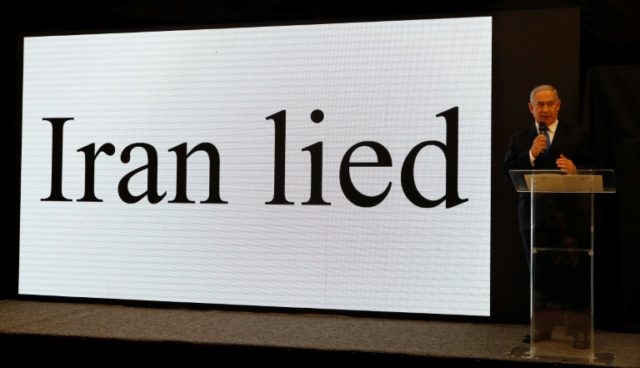Washington (AFP) – Israel’s “proof” of an Iranian nuclear weapons plan that could be activated at any time has divided experts and comes as President Donald Trump weighs the fate of the historic 2015 nuclear agreement with Tehran.
Here is a look at what’s at stake and how Israeli Prime Minister Benjamin Netanyahu’s speech on Monday could influence events.
– Are these documents truly new? –
Netanyahu unveiled what he said were tens of thousands of documents taken by spies.
He said the documents detail an alleged project that Iran was forced to shelve in 2003, but kept ready to put into action at any time.
Experts were divided over the implications.
Those who support the 2015 Iranian nuclear pact said the documents show nothing new and highlight the deal’s importance, while those opposed said it should bolster Trump’s resolve to pull out.
“Netanyahu claimed that Israel has acquired new information proving that Iran lied about it’s nuclear weapons program, prior to 2003. We already knew this — this is not new news,” said the Diplomacy Works think tank, created by former secretary of state John Kerry, who oversaw the 2015 deal.
“This is precisely why America and other world powers — UK, Germany, France, Russia and China — negotiated an arms agreement … to ensure that if Iran decides to lie ever again, an intrusive inspection regime would be in place.”
Ali Vaez, from the International Crisis Group, said Netanyahu’s move was an “attempt at recycling old info to create new hype and push” to convince Trump to pull the plug on the Iran deal and provoke a military conflict.
But the Foundation for Defense of Democracies, a Washington think tank that is hawkish on Iran and opposes the 2015 deal, welcomed Israel’s claim.
“The documents are absolutely new,” FDD senior advisor Richard Goldberg told AFP.
“Iran is on a slow-walk to a nuclear weapon under cover of a flawed deal.”
– What do signatories to the deal think? –
Trump welcomed Netanyahu’s presentation, as did his new Secretary of State Mike Pompeo, who met with the Israeli leader on Sunday in Tel Aviv.
Pompeo, until last week director of the CIA, called the intelligence trove authentic and said much of it was new to US experts.
Trump reiterated his aversion to the “horrible” deal, highlighting provisions in the agreement restricting Iran’s nuclear activities that begin expiring in 2025.
Without commenting on the files themselves, the Europeans have tried to underscore the rationale for making the 2015 deal in the first place — that Iran cannot be trusted and needs inspections.
“All the agreement is based on the assumption that they may lie! That’s the reason of the monitoring mechanism. Cheaters are a risk you take into account in any negotiation,” French ambassador to the United States Gerard Araud said on Twitter.
“The system of controls proves that we do not trust anyone.”
– What next? –
Israel’s announcement appears calibrated for maximum impact on Trump in the run-up to the May 12 deadline he has given the Europeans to find ways to toughen the 2015 deal.
Without these assurances, Trump has signalled he will re-impose sanctions on Iran that had been lifted as part of the pact.
For many observers, Israel, which feels directly threatened by a potentially nuclear Iran, is trying to influence negotiations and derail European efforts to save the agreement.
As Netanyahu presented photographs and graphics on a large screen, it was clear he was addressing Trump more than anyone, Vaez said.
“He had an audience of one tonight: the man who gets his intel briefing from TV theatrics (@POTUS),” he wrote on Twitter.
– What will Trump do? –
The US adminstration says it has not yet decided. But Washington’s support for Israel seems to support the likelihood of a US withdrawal from the deal.
In a statement about Netanyahu’s speech, the White House underscored the US policy that “Iran must never have nuclear weapons.”
“These facts are consistent with what the United States has long known: Iran had a robust, clandestine nuclear weapons program that it has tried and failed to hide from the world and from its own people,” it said.
Supporters of the deal seem resigned to Trump pulling out.
“I’m convinced Trump will withdraw from the deal. I think it’s a mistake, but I can’t stop it,” Dan Shapiro, the US ambassador to Israel under Barack Obama, wrote on Twitter.
French President Emmanuel Macron, who met with Trump last week, is also pessimistic on the deal.
“I listen to what President Trump is saying and it seems to me that he is not very eager to defend it,” Macron said after his visit to the White House.

COMMENTS
Please let us know if you're having issues with commenting.